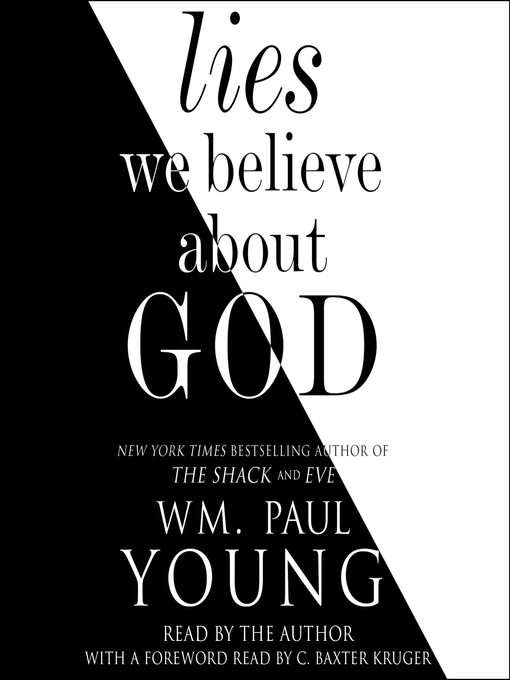I wrote what follows nearly a year ago. I didn’t post it then because honestly, I hate to get involved in quarrels with the many people who will disagree. But as time goes on, I continue to see people adversely influenced by the theology expressed in this book. While it’s increasingly popular today, it stands in conflict with God’s Word. So I will go ahead and post it now.
 Last year, Paul Young, author of The Shack, had a book come out called Lies We Believe About God. Ironically, many of the doctrinal concerns that I and many others expressed about his novel The Shack (and in response, were told “it’s just fiction” and “this isn’t theology” and “that’s not what he’s saying”) have proven to be true. This book clearly reveals the author’s actual theology.
Last year, Paul Young, author of The Shack, had a book come out called Lies We Believe About God. Ironically, many of the doctrinal concerns that I and many others expressed about his novel The Shack (and in response, were told “it’s just fiction” and “this isn’t theology” and “that’s not what he’s saying”) have proven to be true. This book clearly reveals the author’s actual theology.
I wanted to believe the best, and not be quick to misunderstand or accuse. I have friends who read Paul’s writings, and my desire isn’t to take away from the positives they’ve received from The Shack. However, Lies We Believe About God shows in the author’s own words how far he has departed from some basic and central evangelical doctrines. I’ve read the whole book, and I saw truth intermixed with unbiblical error. But as is often the case with false doctrine, the truth serves to make the error appear more credible.
Given the book’s popularity, and the subsequent release of the movie by the same title, I’m disappointed and concerned that the countless people influenced by The Shack and many of its more implicit errors will be led into increasingly significant explicit errors by reading Lies We Believe About God.
To be clear, The Shack has many explicit errors too, but people debated or seemed to not notice what the author was really saying. Many were able to overlook some of the theological problems while at the same time being impacted by the good they found. But in Lies We Believe About God, Paul Young has stated more forthrightly not only his universalism, but also a number of other unbiblical doctrines.
He admits at last (several years ago, I had two three-hour conversations with him in which he hinted this without saying it directly) he really is a universalist. Paul Young says these exact words: “Are you suggesting that everyone is saved? That you believe in universal salvation? That is exactly what I am saying!” (p. 118). That makes it official: no more arguments about whether the author of The Shack is a universalist. He emphatically says he is.
Some of what Lies We Believe About God says about the evangelical view of the cross of Christ makes it sound like those who teach substitutionary atonement would actually be pro-child abuse. In fact, Scripture reveals a Father who sent His Son, and a Son, coeternal and coequal with the Father and the Holy Spirit, who willingly laid His life down for us on the cross (John 10:17-18). He was and is the God-man, and He was both sent by the Father and went willingly to the cross, not as a helpless or victimized child. (See Bruce Ware’s article The Father Sent Jesus to the Cross.)
In reading Lies We Believe About God, at times I marveled at all the precious truths the author is calling outright falsehoods. Below are some statements he claims are all lies, along with some quotes from the book:
-
God is good. I am not.
-
God is in control.
- “God submits rather than controls and joins us in the resulting mess of relationship, to participate in co-creating the possibility of life, even in the face of death.” (p. 44)
-
God does not submit.
-
“What is the incarnation—God becoming fully human—if not complete and utter submission to us? What about the cross, in which God submits to our anger, rage, and wrath?” (p. 48)
- God wants to use me.
- You need to get saved.
- “The Good News is not that Jesus has opened up the possibility of salvation and you have been invited to receive Jesus into your life. The Gospel is that Jesus has already included you into His life, into His relationship with God the Father, and into His anointing in the Holy Spirit. The Good News is that Jesus did this without your vote, and whether you believe it or not won’t make it any less or more true.” (pp. 117-118)
-
Hell is separation from God.
-
“I propose the possibility that hell is not separation from Jesus but that it is the pain of resisting our salvation in Jesus while not being able to escape Him who is True Love.” (p. 138)
-
Not everyone is a child of God.
-
Sin separates us from God.
-
“Does sin separate us from God? Separation is the fundamental building block of religion. …Once division and separation are established as real, entire religious systems, institutions, and hierarchies can be built as the path to salvation or enlightenment, and people will pay blood, sweat, tears, and money to get from the damned side to the saved. We Christians have long espoused a theology of separation. A lot of ‘my people’ will believe that the following statement is in the Bible, but it isn’t: ‘You have sinned, and you are separated from God.’” (pp. 230-231)
-
The Cross was God’s idea.
These are not lies! They are truths, and there is plenty of biblical support for each of them. Of course, not everything everyone says related to these truths is accurate (but that’s always true). To say these are all “lies” is unbiblical, irresponsible, and misleading.
While I could elaborate with a number of Scriptures for each of these, take just the last one, said to be a lie: the Cross was God’s idea. Acts 4:27-28 says, “Indeed Herod and Pontius Pilate met together with the Gentiles and the people of Israel in this city to conspire against your holy servant Jesus, whom you anointed. They did what your power and will had decided beforehand should happen.”
We could add the words of Isaiah 53, that Jesus was “punished by God, stricken by him, and afflicted. But he was pierced for our transgressions, he was crushed for our iniquities; the punishment that brought us peace was on him, and by his wounds we are healed. We all, like sheep, have gone astray, each of us has turned to our own way; and the LORD has laid on him the iniquity of us all…for the transgression of my people he was punished….though he had done no violence, nor was any deceit in his mouth. Yet it was the LORD’s will to crush him and cause him to suffer.”
Here is a book supposedly identifying lies we believe about God while dismantling biblical truths at the heart of the Gospel message. It attempts to replace these truths with ACTUAL untruths, lies about God!
If it seems unfair for someone to say the author is speaking lies, consider that his entire book is dedicated to the idea that evangelical pastors and Christ-followers who have been teaching these biblical doctrines for hundreds or thousands of years are liars.
The truth is, we desperately need to be saved by Jesus—that is, to embrace what He has provided on our behalf: “We implore you on behalf of Christ, be reconciled to God” (2 Corinthians 5:20). We need to be saved from our sins, to be rescued, delivered, reconciled, and born again, so we can enter into God’s goodness and the righteousness of Jesus.
I recommend this summary of some of the unbiblical content in Lies We Believe About God, well expressed by Tim Challies.
While Paul Young remains a likable person, this doesn’t change the danger of revising God’s truth and telling people nice-sounding things on God’s behalf, when some of those explicitly contradict what He tells us in His Word: “Every word of God proves true; he is a shield to those who take refuge in him. Do not add to his words, lest he rebuke you and you be found a liar” (Proverbs 30:5-6).
What God said to Jeremiah about the dreams and words of so-called prophets in that day applies to us today when it comes to our choice between believing what God has said in His revealed Word, or believing the new and more appealing things that people say to replace the biblical teachings:
“I have heard what the prophets say who prophesy lies in my name. They say, ‘I had a dream! I had a dream!’ How long will this continue in the hearts of these lying prophets, who prophesy the delusions of their own minds? They think the dreams they tell one another will make my people forget my name, just as their ancestors forgot my name through Baal worship.
“Let the prophet who has a dream recount the dream, but let the one who has my word speak it faithfully. For what has straw to do with grain?” declares the Lord. “Is not my word like fire,” declares the Lord, “and like a hammer that breaks a rock in pieces?
“Therefore,” declares the Lord, “I am against the prophets who steal from one another words supposedly from me. Yes,” declares the Lord, “I am against the prophets who wag their own tongues and yet declare, ‘The Lord declares.’
“Indeed, I am against those who prophesy false dreams,” declares the Lord. “They tell them and lead my people astray with their reckless lies, yet I did not send or appoint them. They do not benefit these people in the least,” declares the Lord.
—Jeremiah 23:25-32
For more on the topic of truth, see Randy Alcorn’s book Grace and Truth Paradox.





